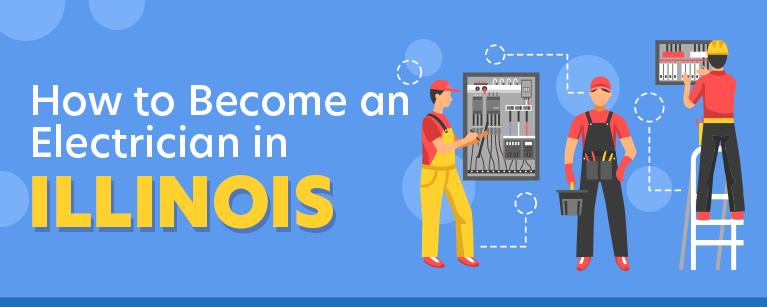
If you’re a detail-oriented problem solver with keen critical thinking skills and a knack for working with your hands, becoming an electrician may be an excellent career path for you!
But how should you go about pursuing it?
Keep reading this article to find out!
Table of Contents
Electrician Job Duties and Skills in Illinois
An electrician’s necessary job duties and skills include:
- Handling any electrical emergencies that may crop up
- Installing, maintaining, and repairing electrical systems and equipment, including light fixtures, circuit breakers, electrical appliances, and other similar projects
- Regularly performing quality control assessments on electrical systems and equipment to diagnose problems
- Making sure that all systems are compliant with both the local as well as the national electrical regulations
You’ll also need to possess some soft skills to be successful in the electrical industry, such as:
- Good leadership skills
- Time management skills
- Critical thinking skills
- Basic math skills
- Computer skills
- Customer service skills
And more.
All in all, you’ll have to be a well-rounded individual with a broad range of knowledge to work as an electrician.
How to Become an Electrician in Illinois
Do you still want to become an electrician?
Read below to find the steps you need to take to pursue this career!
Make Sure You Meet The Requirements
To be eligible for an electrical license in Illinois, you must be 21 years old or older.
You must also make sure to have a high school diploma or a GED.
Before applying to take the licensing exam, make sure you’ve met both of these requirements!
Get All the Necessary Classroom Hours
You have to complete 720 hours of classroom training before you can apply for your electrical license in Illinois.
Be sure you meet this requirement, or else you will not be able to get your electrical license.
Complete The Required Training
You also have to make sure to gain 8,000 hours of hands-on work experience, or else you won’t be eligible to receive an electrical license in Illinois.
You can achieve this by either completing an apprenticeship program or while attending a technical school or a community college.
Apply For Your License
Once you are sure you’ve met all the necessary requirements, you can apply for your license!
To do this, you’ll need to take and pass an electrical exam.
The exam will be, at minimum, 75 questions, and you’ll need a score of 70% or higher to pass.
Good luck!
Training Programs for Electricians in Illinois
Here are some institutions in Illinois that offer electrical training programs.
Prairie State College
Students attending Prairie State College can look forward to participating in an Industrial Electricity program that will prepare them for entry-level electrical work.
Prairiestate.edu explains, “The world continues to become more wired and the proliferation of electrical systems creates a need for skilled electricians to meet the demands of a variety of industries.
Prairie State College is meeting those needs offering training in electronics as well as teaching the skills needed to become an electrician.”
the U.S. Apprenticeship Training has approved Prairie State’s A.A.S. degree program, which includes training in electronics as well as electrician skills.
Prairie State offers a certificate for Industrial Electricians.
This certificate accounts for 35 credits.
Rock Valley College
Rock Valley College‘s Electrical Technician program promises to train students to:
- Use the National Electrical Code® (NEC®) info properly
- Apply knowledge of electrical boxes and mounting procedures to electrical tasks
- Properly bend, cut, ream, and thread conduit
- Correctly select and install various types of raceways and fittings
- Properly build a low-voltage and coax cable
- Properly select and install conductors
And more.
The program focuses on teaching students a broad range of skills that will help them land a wide variety of job opportunities.
Triton College
Triton College offers students the opportunity to choose from hundreds of Electrical Certificates that are currently available to earn.
“Triton’s Electrical program is a great option for anyone interested in a hands-on career installing, repairing, maintaining, and servicing electrical and electronics equipment.”
Students can look forward to using various wireless systems to increase bandwidth for ever-increasing data streams, or for roles in industries from generation to transmission to electric power.
The program is perfect for students who want to become electrical engineering technicians, although it offers a diverse range of options.
Illinois Central College
Illinois Central College offers the Industrial Electrical Technology program, which students can earn an Associate in Applied Science from after completing successfully.
According to Icc.edu, “The program provides a comprehensive education on electrical theory, code, safety, and modern industrial, commercial, and residential electrical technology.”
Students who take this program will learn installation and wiring techniques.
They’ll also reap the benefits of the modern classroom and lab equipment, which will help them learn the skills they’ll need when starting any electrician job.
The program offers plenty of hands-on learning in high-tech labs, plus promises to help students “learn the proficiencies required of an entry-level Industrial Electrical Technician.”
| School Name | Address |
|---|---|
| Prairie State College | 202 South Halsted Street, Chicago Heights, Illinois 60411-8226 |
| Rock Valley College | 3301 N Mulford Rd, Rockford, Illinois 61114-5699 |
| Triton College | 2000 5th Ave, River Grove, Illinois 60171-1995 |
| Illinois Central College | 1 College Dr, East Peoria, IL 61635 |
Electrician Salaries in Illinois
Illinois electricians usually start out making $45,000 per year, but on average, electricians in Illinois will earn $60,000 a year or more!
If that sounds good to you, you may want to know more about the earning potential for those in the electrical profession.
You can view the chart below for more information.
Annual Salary Range:| Location | Avg. Annual Salary |
|---|---|
| Chicago | $68,843 |
| Cicero | $68,843 |
| Aurora | $68,261 |
| Rockford | $64,268 |
| Elgin | $67,729 |
| Naperville | $67,579 |
| Joliet | $67,096 |
| Waukegan | $65,211 |
| Peoria | $63,035 |
| Springfield | $61,756 |
Regional Salary in Illinois
| Region | Employed | Avg. Annual Salary | Avg. Hourly Pay | Top 10% Annual Salary | Bottom 10% Annual Salary |
|---|---|---|---|---|---|
| Bloomington, IL | 460 | $75,340 | $36.22 | $96,160 | $46,400 |
| Carbondale-Marion, IL | 160 | $79,580 | $38.26 | $108,490 | $45,930 |
| Champaign-Urbana, IL | 300 | $78,090 | $37.54 | $103,940 | $46,420 |
| Chicago-Naperville-Elgin, IL-IN-WI | 14,960 | $88,990 | $42.79 | $118,520 | $48,830 |
| Danville, IL | 80 | $68,140 | $32.76 | $94,970 | $37,460 |
| Decatur, IL | 370 | $82,320 | $39.58 | $115,750 | $49,230 |
| Kankakee, IL | 100 | $76,160 | $36.61 | $104,520 | $37,980 |
| Peoria, IL | 730 | $72,870 | $35.04 | $98,770 | $41,310 |
| Rockford, IL | 380 | $72,310 | $34.77 | $96,660 | $42,250 |
| Springfield, IL | 290 | $73,470 | $35.32 | $97,820 | $38,720 |
* Employment conditions in your area may vary.
Frequently Asked Questions
Who issues electrical licenses in Illinois?
Municipalities because there is no official electrical licensing board in Illinois.
Do electricians have to be licensed in Illinois?
Yes.
You cannot legally do electrical work without any sort of electrical license in the state of Illinois.
Can I do my own electrical work if I’m a homeowner in Illinois?
No.
Under no circumstances can someone without an electrical license do electrical work in Illinois.
Electrician Info by State
- Alabama
- Alaska
- Arizona
- Arkansas
- California
- Colorado
- Connecticut
- Delaware
- Florida
- Georgia
- Hawaii
- Idaho
- Illinois
- Indiana
- Iowa
- Kansas
- Kentucky
- Louisiana
- Maine
- Maryland
- Massachusetts
- Michigan
- Minnesota
- Mississippi
- Missouri
- Montana
- Nebraska
- Nevada
- New Hampshire
- New Jersey
- New Mexico
- New York
- North Carolina
- North Dakota
- Ohio
- Oklahoma
- Oregon
- Pennsylvania
- Rhode Island
- South Carolina
- South Dakota
- Tennessee
- Texas
- Utah
- Vermont
- Virginia
- Washington
- West Virginia
- Wisconsin
- Wyoming









